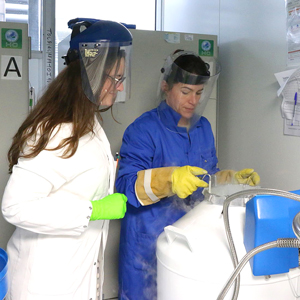Planning and Priorities
Accelerating innovation in cancer research and prevention requires comprehensive planning for current operations and well as longer-term goals. With a solid foundation of research innovation and prevention serves built through 14 years of steady investment, CPRIT has positioned the state for new life science opportunities.
The CPRIT Oversight Committee and staff use strategic and operational planning to identify near term and future opportunities to create and expedite innovation in cancer research and breakthroughs in cancer prevention. This sets the course for CPRIT’s activities year by year and for the future.
The four components of CPRIT’s long-term vision for the agency and each of its three programs serve as our guide.
Decrease cancer in Texas
through prevention and translation of discoveries into treatments and cures
Focus on disparities
in cancer incidence, mortality, and access to care
Accelerate advancements
in the scientific understanding of cancer
Enhance life sciences infrastructure
in the state
The Oversight Committee adopted its fiscal year 2023 priorities for CPRIT’s academic research, product development research, and prevention programs at its November 18, 2021, meeting. These annual program priorities guide CPRIT’s requests for applications and the evaluation of grant proposals. In addition to priorities specific to each grant program, CPRIT’s three programs share overarching priorities that span the cancer continuum from discovery to delivery. Although the priorities, listed below, serve as strategic areas of emphasis, they do not exclude funding innovative projects in areas outside of identified priorities.
Prevention and Early Detection Initiatives
The best way to reduce the physical, emotional, and financial burden of cancer is by preventing its occurrence and detecting it at its earliest stages. However, prevention and early detection efforts receive little funding relative to the amount devoted to curing advanced cancers.
Working together, each of CPRIT’s programs play a part in fulfilling this goal. Academic research discovers novel approaches to prevent and detect cancer early. Product development research provides new methods, diagnostics, imaging, and devices for early cancer detection. The prevention program puts these innovative approaches into practice.
Early Translational Research
Innovative cancer prevention efforts and treatments always start with an initial discovery. Grants from the federal government and foundations fund the basic research enabling these scientific discoveries. There is a lack of money to support the research and development activities necessary to translate initial discoveries into available therapies.
Opportunities for inter-program strategic investment by CPRIT include funding translational research that bridges the gap between basic research and product development, and between research on preventive measures and innovative technologies for early cancer detection. Funding these activities may stimulate new public-private partnerships in Texas.
Enhance Texas’ Research Capacity and Life Sciences Infrastructure
Texas has earned a reputation for cancer research superiority through a decade of unparalleled recruitment efforts bringing cancer scientists and clinicians, at all career levels, to academic institutions in Texas. Establishing Texas as a preeminent cancer research hub attracts industry interested in developing groundbreaking treatments.

The best approaches to reduce the physical, emotional, and financial impacts of cancer are to identify evidence-based strategies to prevent cancer from developing and to detect cancer early when it is easy to treat. To this end, the Oversight Committee prioritized implementation research that accelerates adoption and deployment of evidence-based prevention and screening interventions.
One CPRIT-funded project fulfilling this program priority is the $7.5 million grant (RP230426) approved in August 2023 to the Baylor Research Institute in Dallas. The award will fund the Texas Connect for Cancer Prevention Study and develop a statewide cohort within the National Cancer Institute (NCI) Connect for Cancer Prevention Study.
As the U.S. population ages and lifestyles and behaviors continue to change, experts expect the number of people diagnosed with cancer will increase over the next decade. While cancer treatments are improving, effective, evidence-based cancer prevention strategies are critical to reducing the cancer burden.
The NCI Connect study is a long-term, multistate initiative to better understand the causes of cancer and how to prevent it. Researchers will collect information from study participants (people 40 – 65 years old with no cancer history) that shed light on how the way we live, our genetics, and our medical history affect the risk of developing and surviving cancer.
Information gathered in the Connect study has the most scientific value if it represents people from many places and backgrounds. Demographically, Texas is the most diverse state, with more and different races, ethnicities, religions, languages, and cultures than any other state. Texas’ participation in the Connect for Cancer Prevention Study is critical to building a large, diverse database by engaging with people and communities underrepresented in medical research. The Baylor Scott & White Health System will work with urban, rural, low-income, and minority populations to better understand the causes of and how to prevent cancer.

Two priorities of the CPRIT Product Development Research program are funding Texas companies developing novel projects that address large or challenging unmet needs in cancer therapy and attracting promising companies to Texas. Recruiting and expanding early stage biotech companies will facilitate the growth of life science clusters needed to compete against other regions in the U.S.
A good example of these priorities in practice is Invectys, Inc., a clinical-stage biopharmaceutical company, founded in 2010 out of the Pasteur Institute in Paris, France, which is developing novel immuno-therapeutic solutions for advanced cancers. CPRIT awarded Invectys USA, Inc. a $14.2 million CPRIT Product Development Research Company Relocation grant (DP200034) in 2020 to advance its chimeric antigen receptor (CAR) T platform and conduct clinical trials in Texas. Establishing their U.S. headquarters in Houston brings an experienced and innovative company to Texas that will create jobs and provide the state with a high potential return on its investment.
Invectys’ CAR-T platform focuses on the human leukocyte antigen G (HLA-G) molecule, a powerful modulator of the human immune system. Typically expressed only during pregnancy, HLA-G protects the developing fetus from the mother's immune system. However, in cancer, tumors may hijack HLA-G to create a protective microenvironment and shut down the patient’s immune response to the disease. More than 50% of cancers express the HLA-G immune checkpoint.
Immunotherapy is a potent new weapon in the anti-cancer arsenal, but only a small percentage of patients respond to treatments currently available. Invectys’ approach to reprogram immune cells to become killer cells for any tumor cell that is HLA-G positive will increase patients’ responsiveness to immunotherapy. Mice treated with anti-HLA-G CAR-T cells have shown a near-total absence of tumor growth. If successful in humans, this will address a large unmet need in cancer therapy.
Based on compelling data from its Investigational New Drug submission and the potential for addressing the unmet need for patients with HLA-G positive advanced or metastatic renal cell carcinoma (RCC) who have failed other RCC therapies, the U.S. Food and Drug Administration granted Invectys Fast Track designation in July 2023. Fast Track designation is a critical regulatory designation that expedites the development and review of therapies that address unmet medical needs in serious conditions.
The company initiated a Phase I/2a clinical trial (NCT05672459) at The University of Texas MD Anderson Cancer Center in June 2023 for HLA-G-positive solid tumor patients, particularly those with kidney and ovarian cancers. The co-principal investigators for the trial are Aung Naing, M.D., FACP, professor, Investigational Cancer Therapeutics at MD Anderson, and Samer Srour, MBChB, M.S., assistant professor, Department of Stem Cell Transplantation and Cellular Therapy at MD Anderson.

A central concept in the Prevention Program priorities adopted by the CPRIT Oversight Committee is to fund projects that help populations and geographic areas of the state disproportionately affected by cancer incidence, mortality, or cancer risk prevalence. The ability to reach these underserved populations is an important factor in CPRIT-funded prevention programs. An example of the prevention priorities in practice is the Active Living After Cancer Program (ALAC) project, which improves the quality of life of Texas cancer survivors.
Cancer diagnosis and treatment often has lasting effects on cancer survivors, including declines in physical functioning and lingering fatigue and psychological distress. Exercise and physical activity can address these problems, but most survivors do not meet exercise recommendations. Cancer survivors benefit from physical activity programs tailored to their unique needs, particularly programs that are accessible to survivors who live in rural areas, have lower socioeconomic status, or do not speak English.
CPRIT first funded the ALAC program in 2013. Based on research done at The University of Texas MD Anderson Cancer Center by Karen Basen-Engquist, Ph.D., M.P.H., the ALAC program improves cancer survivors’ physical functioning and quality of life by increasing physical activity and navigating survivors to survivorship services in the community.
ALAC is a 12-session group program that provides training in the skills needed to make a long-term commitment to a physically active lifestyle, as well as education about cancer survivorship topics and group support. The program is a partnership between MD Anderson and community organizations in Houston (Kelsey Research Foundation), El Paso (Cancer and Chronic Disease Consortium), Tyler (The University of Texas Health Science Center at Tyler), and Beaumont (Gift of Life). The community partners deliver the program and develop relationships with local healthcare and organizations that refer participants. These partnerships have enabled the program to reach survivors who are medically underserved, Spanish-speaking, or live in rural areas.
More than 1,750 cancer survivors enrolled in ALAC program over the past nine years, and approximately 75% complete the program. Participants significantly increase their physical activity and improve their mental and physical quality of life. During the COVID pandemic the previously in-person program transitioned to a virtual format, which showed similar benefits to in-person delivery. Community partners offer the ALAC program in virtual, in-person, and hybrid formats.
CPRIT has awarded the ALAC program $6.6 million through six prevention grants since 2013 (PP130079, PP170023, PP200028, PP230074 and PP230069), including two recent grants to MD Anderson to continue providing ALAC through community partners (PP230074) as well as a dissemination grant (PP230069) to develop an online toolkit to help other community cancer centers provide the program to their patients. These grants will enable increased reach for the ALAC program, to benefit a greater proportion of Texas’ nearly one million cancer survivors.
CPRIT’s $3.38 billion investment in 1,901 of the best ideas in cancer research, product development research, and prevention is building a vibrant life sciences ecosystem across the state. This groundbreaking work enhances Texas’ competitive edge in the global fight against cancer and is saving lives. From a foundation built through 14 years of steady investment, Texas can now expand into new life science opportunities. Setting the course for the next decade of work, CPRIT and its stakeholders have identified several preliminary initiatives for further development.